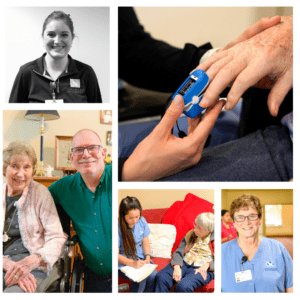Alzheimer’s Disease (AD) is a neurogenerative brain disorder that progressively causes more damage. AD affects over 6 million Americans and there is currently no cure for the disease. The progression of Alzheimer’s can be difficult for families to deal with. We wanted to briefly go over what to expect from the progression of AD so families can know what to expect.
Progression of Alzheimer’s Disease
AD normally occurs later in life but can be diagnosed in rare cases in a person’s 30s or 40s. The disease itself is not fatal but always leads to other fatal conditions later in life. People with AD can often live into their 80s and 90s if they are properly cared for.
Early Alzheimer’s
Alzheimer\’s Disease is detected in the majority of patients during their mid-60s. This is referred to as late-onset AD. People diagnosed with AD in their 30s-50s are referred to as having early-onset AD.
Both early- & late-onset AD is diagnosed when a patient exhibits many of the following signs, symptoms & behaviors:
-
Memory loss
-
Poor judgment
-
Repeating themselves
-
Losing things at home
-
Getting lost in familiar areas
-
Increased aggression or emotional instability
The severity of these symptoms can vary from person to person. AD itself can only be diagnosed by a doctor. This list is not definitive and if you have a loved one experiencing several of these symptoms you may want to schedule an appointment with your doctor.
Late Alzheimer’s
The final stage of AD is referred to as late-stage Alzheimer’s Disease. This is where a patient will need a full-time caregiver to assist with all daily activities. Late-stage AD is diagnosed when a patient is totally incapable of living an independent lifestyle.
Most patients with late-stage AD will be checked into a nursing home, usually one specifically for issues like AD and dementia. Patients with resources can stay in their own homes but will require the assistance of a full-time caregiver all day, every day.
Navigating the Progression of Alzheimer’s
Make sure you speak to your loved one as soon as possible after a diagnosis. Having a discussion about their wishes while they are still themselves can go a long way when it comes to having a plan.
Many doctors, caregivers, and healthcare professionals can also help the families of a person with AD understand what to expect. Dealing with a loved one forgetting the people they love can be incredibly difficult–having a pre-existing plan allows families to have contingencies in place when a specific situation arises.
Charlin Health Services
At Charlin Health Services we pride ourselves on honor, integrity, excellence, compassion, dignity, and trust. If you have any needs or questions about health services, hospice care, or other medical needs, please send us an email or give us a call.
About Our Alzheimer’s Expert
Emilynn Bryce BSN, RN is the hospice director of nursing at Charlin Healthcare Services. Emilynn received a BS in registered nursing from St. Louis University. After graduating, Emilynn worked as a registered nurse at St. Luke’s Hospital in Chesterfield, MO. Emilynn has been with Charlin since 2018.
Listen to the full Charlin Alzheimer’s podcast here.



